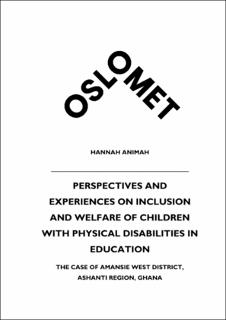| dc.description.abstract | This study explores perspectives and experiences on inclusion and welfare of children with physical disabilities in Ghana’s education system, specifically in the Amansie West District in the Ashanti Region of Ghana. Four concepts facilitate understanding of the phenomena being studied: the social, medical, and human rights models of disability and the theory of human capital. The literature under two thematic areas in line with the objectives of the study was reviewed: (1) parents’ involvement in the education of Children with Disabilities and (2) teachers’ qualifications and attitudes towards children with impairments in school settings. The qualitative methods study collected data via interviews and observations. Purposive and snowball sampling were used to attain a sample of 35 participants representing a range of actors, among whom children with disabilities were the primary respondents along with other key stakeholders in inclusive education, namely parents, social welfare officers, teachers, education officers, staff of disability-focused NGOs, community leaders, and leaders of the Organisation of Persons with Disability. The study sample does not represent the whole of Ghana; it is a study of one selected district (Amansie West). The study relied on the transcribed participant narrations to analyze selected themes relevant to the study’s objectives. Research questions addressed children with disabilities’ concerns in the school setting, their parents’ involvement in their education, their teachers attitudes and qualifications, and expectations of the schools and government. The study’s findings show that, even though children with physical disabilities are included in mainstream schools in their communities, they face numerous physical, social, and economic barriers that impede their access to, and undermine the quality and the benefits they derive from education. The study recommends more efforts to be put into public education and implementing inclusive practices to ensure that children with disabilities benefit optimally from inclusive education. | en_US |
